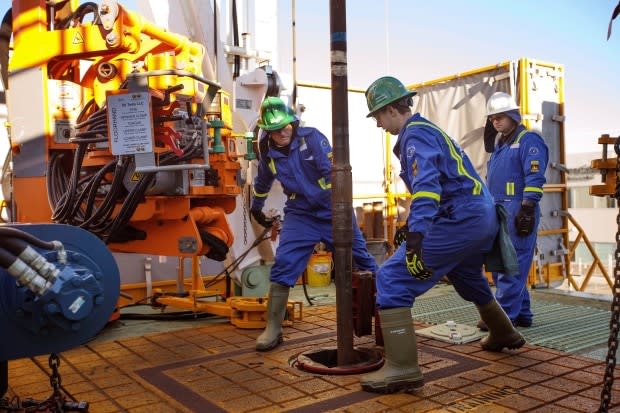Alberta faces 'mild recession in 2019' due largely to pipeline uncertainty, Conference Board forecasts
The Conference Board of Canada now predicts that Alberta's economy will shrink by 0.8 per cent this year, in large part due to uncertainty regarding pipelines.
The province "will face a mild recession in 2019, but some areas are showing signs of improvement after a rough start to the year," the organization said in its Summer Outlook report, released Tuesday.
In its Spring Outlook, released in May, the board had forecast an economic contraction of 0.1 per cent for the year.
But it now says things have worsened, although the contraction this year will be "not nearly as severe as the 2015-16 recession," and a rebound is expected in 2020.
A recession is often defined as two consecutive quarters of economic contraction, though some economists suggest the criteria are far more complicated.
Conference Board chief economist Pedro Antunes says his preferred definition includes some sense of "the impact on households," which is more complex than simply the change in GDP. But, as a group, the board was comfortable describing its 2019 forecast for Alberta as a "mild recession," he said.
"The whole year is a slight contraction and so, yes, we would define that as a recession."
Construction and drilling will be "hit the hardest" this year, the report says, with expected declines of 10.4 per cent and 30.3 per cent, respectively.
"Both declines are in large part due to the position of companies in the oil and gas sector regarding the uncertainty regarding pipelines," it adds.
In particular, the report highlights the latest obstacle for the Enbridge Line 3 pipeline. In June, the Minnesota Court of Appeals ruled that state regulators must conduct a further review of the project because its environmental impact statement didn't address the possibility of an oil spill into the Lake Superior watershed.
The "only chance of additional capacity being built," the report says, depends on whether a $3.7-billion government rail contract "is picked up by the private sector."
The previous NDP government contracted CP and CN Rail to move crude by rail, in the absence of pipeline expansion, but the new UCP government has cancelled those deals and is working to move them to the private sector.

If there's a silver lining to the province's economic forecast, the Conference Board says job growth will continue in 2019, albeit at a subdued pace.
"Labour markets will feel the impact of the contraction in real GDP growth, but there will still be job creation," the report says.
That's due in part to the construction of new petrochemical complexes, which the report says will add "fire power to Alberta's economic engine despite its energy sector being clouded with uncertainty."
Because of job-cutting in the oil and gas sector during the 2015-16 recession, the Conference Board notes, many major companies are now lean and highly productive.
"With much of the turmoil concentrated in the energy sector, where output per worker has sky-rocketed in recent years ... the number of layoffs in the energy sector [in 2019] will not be significant."
Overall, Antunes expects little change in the province's unemployment rate through the end of 2019.
"We have seen a bit of a rebound in some areas in the province that has allowed, essentially, employment to stabilize," he said.
The report forecasts that Alberta's economy will return to growth in 2020, with a two per cent expansion of GDP. That's down from a forecast of 2.7 per cent in its Spring Outlook of three months earlier.

Nationally, the latest report forecasts the Canadian economy will grow by 1.4 per cent this year and 1.8 per cent in 2020.


